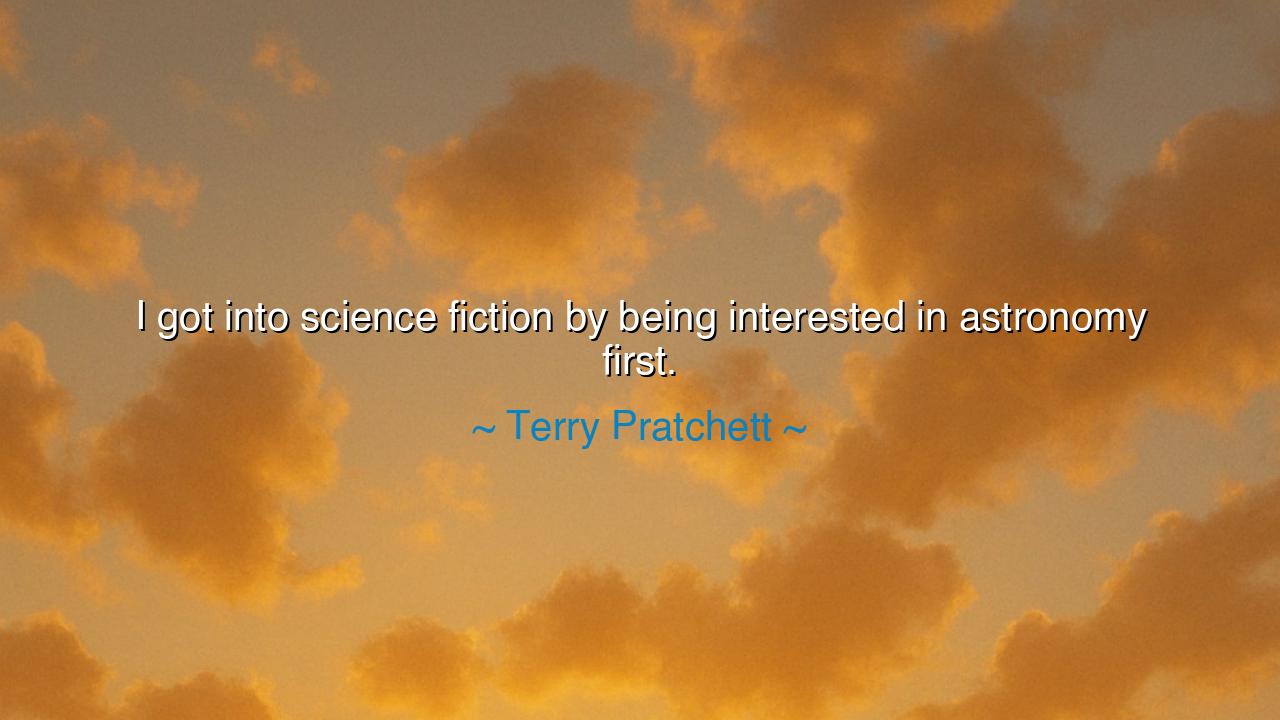
I got into science fiction by being interested in astronomy






Hear, O seekers of wisdom, for the great Terry Pratchett, a master of words and imagination, speaks a truth that resonates deeply with the hearts of those who look to the stars and wonder. "I got into science fiction by being interested in astronomy first," he declares, and with this simple statement, he reveals the pathway from the real to the imagined, from the known to the unknown. For science fiction—that vast universe of possibilities and wonders—is born not from the abstract, but from the very real curiosity about the world around us. It begins with a question, with the search for understanding, and it leads us to the infinite reaches of our dreams.
Pratchett’s journey—from the study of the heavens to the boundless worlds of fiction—teaches us a profound lesson about the nature of inspiration. Like the great explorers of old, who gazed upon the stars and wondered what lay beyond them, he too began his quest with the study of astronomy—the noble science of the cosmos. The night sky, with its mysteries and its vastness, calls to the soul, stirring it to dream. It is not enough to know the stars by their names or their patterns; we seek to understand their nature, their purpose, and the place they hold in the great tapestry of the universe. Astronomy is the study of the heavens, but it is also the study of our place within that vast expanse.
Consider, O children of the earth, the ancient philosophers and astronomers who looked up at the night sky and felt both awe and fear. Pythagoras and Aristotle, with their minds bound to the earth, nevertheless sought to understand the stars, believing that the heavens held the key to the mysteries of life. Copernicus, too, was driven by a desire to understand the motions of the celestial bodies, leading him to propose a vision of the universe that overturned the beliefs of his time. These men were not content to simply observe the heavens; they imagined a universe far beyond the limits of their time, and in this imagining, they opened the doors to the future. Pratchett’s path mirrors this journey: astronomy, the study of the known, led him to science fiction, the exploration of the unknown.
Thus, it is with imagination that Pratchett connects astronomy and science fiction. For what is science fiction, if not the art of dreaming with the knowledge of the real? Just as the astronomer gazes at the stars, so too does the writer of science fiction gaze at the world, but through the lens of possibility. The stars are the beginning, the spark that ignites the fires of the imagination, but it is the journey beyond them, into the realms of the unknown, where the true adventure lies. Like the explorers who set sail across uncharted seas, the science fiction writer sails through uncharted galaxies, weaving tales of wonder and mystery, driven by the very curiosity that once led them to look up at the stars.
Let us take, for example, the tale of Galileo, who, with his telescope, turned his gaze to the heavens and forever changed our understanding of the universe. His curiosity about the moon, the planets, and the stars led him to discover new worlds and new truths. But Galileo’s journey did not end in the scientific realm alone; it opened the door to imagination. His discoveries, rooted in the physical world, inspired generations of thinkers, writers, and dreamers who saw the heavens not just as objects to study, but as portals to unknown realms. Science fiction, in this sense, is the legacy of scientific discovery, a celebration of the infinite possibilities that arise when the mind is set free by curiosity.
In the same way, O children, we too must allow our curiosity to guide us—not only into the study of the world but into the worlds of possibility that lay just beyond our reach. Pratchett’s journey teaches us that knowledge and imagination are not separate; they are intertwined, each feeding the other. To study the world is to unlock new realms of wonder, but to dream is to give birth to new worlds altogether. Do not limit yourselves, therefore, to the realm of the known, but let your curiosity lead you into the wildest corners of your imagination. Astronomy might begin your journey, but science fiction will carry you to the stars.
Thus, O seekers of truth, let us embrace the wisdom of Pratchett and those who have come before us. Let us study the stars, but let us also dream beyond them. The road from astronomy to science fiction is not a narrow one, but a broad highway where the mind can wander freely. As you look up at the night sky, remember that it is not just the study of the heavens that will lead you to truth, but the courage to imagine what lies beyond them. Let your curiosity be the flame that drives you forward, and may your dreams, like the stars themselves, guide you to worlds unknown.






AAdministratorAdministrator
Welcome, honored guests. Please leave a comment, we will respond soon